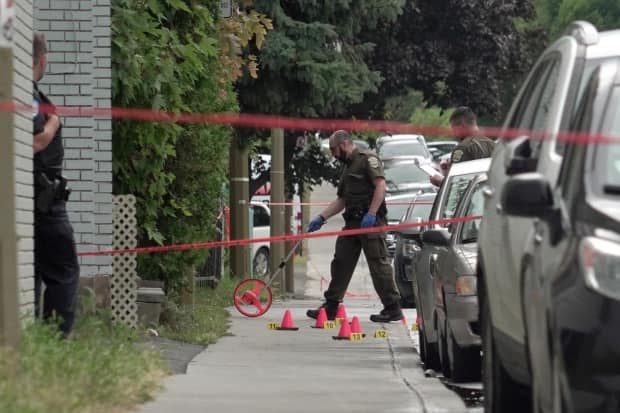Families of victims of Quebec police interventions call for greater transparency
The families of two people who died during police interventions want the Quebec government to make public a report detailing the first three years of work conducted by the province's police watchdog.
The unit, known in French as the Bureau des Enquêtes Indépendantes (BEI), was created in June 2016, to investigate cases where civilians are seriously injured or killed in police operations.
"This process can't be done behind closed doors," Eve-Marie Lacasse, co-ordinator of Ligue des droits et libertés, said at a news conference Monday alongside the families.
"We demand that this report be the subject of a parliamentary commission, with hearings."
Lacasse said the hearings would allow victims and advocates to give feedback on the unit, which critics say has too close a relationship with the police forces under investigation.
Tracy Wing, whose 17-year-old son Riley Fairholm died in 2018 after being shot by provincial police in Lac-Brome, has contended investigators were slow to question important witnesses and collect evidence.
On Monday, she said she has a question for Public Security Minister Geneviève Guilbault: "When will the public be informed of the version of witnesses and not just the version of police?"
Quebec's police ethics commission is investigating the intervention and the alleged non-compliance of the BEI procedures by SQ officers in Fairholm's case.
Conflict of interest?
Cesur Celik, father of the late Koray Kevin Celik, raised concern the BEI's investigation into his son's death by Montreal police officer was staffed by three former members of the same force — a fact that only came to light through an access to information request.
"The BEI is not independent from police and in the case of our son there was clearly a conflict [of interest]," he said the news conference.

Alexandre Popovic, a member of the advocacy group the Coalition contre la répression et les abus policiers, echoed that point.
"We cannot have a case where a former police officer is investigating an event that involved the very same police force he used to work for," said Popovic.
There could be other cases like Celik's, he said, but the information isn't readily available.
Quebec prosecutors have said the force used by officers was justified in Celik's case. The autopsy report indicates his death is attributable to cardio-respiratory arrest caused by intoxication.
In a statement, a spokesperson for Quebec Public Security Minister Geneviève Guilbault said the report would be made public by the middle of next month.
Launching a parliamentary commission would require additional steps, and the support of the majority of each party in the legislature, the spokesperson said.
The BEI said it can't comment on these specific cases because one of them is the subject of a complaint before the police ethics commission, and in one of the cases the family is taking legal action against the BEI.
"In every file that we investigate, the BEI names one investigator that has a special link with the family. Anytime they have questions, or they want to speak about what's happening, they have the number to call this investigator," the police watchdog said.

